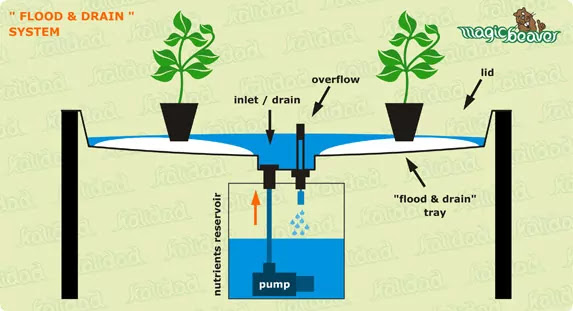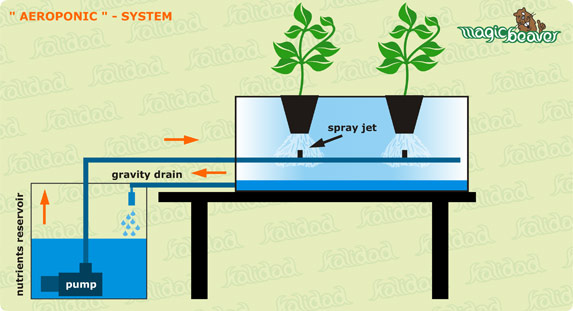Hydroponics Definition :
Hydroponics farming is a strategy for developing plants in a water based, nutrient rich arrangement or medium. Hydroponics doesn't utilize soil, rather the root framework is upheld utilizing an inert medium, for example, perlite, clay, peat greenery or vermiculite. The root ingests adjusted nutrients broke down in water that meets all the plant improvement prerequisites.
Hydroponics :
The word was derived from the Greek words, Hydro implies ' water ' and Ponic signifies ' work ' , in a real sense 'water working'.
Hydroponics system :
Numerous creative frameworks have been built up that takes the place of the customary rock filled bed. While assessing the type of system to introduce, thought ought to be given to such factors as the kind of yield developed, space necessities, developing time, supportive system and financial matters.
These frameworks or systems can be set up in either a nursery or greenhouse. A few cultivators utilize both; the development space for germination and seedling creation and the nursery to develop the harvest. The additional warmth from the growing room lights might be utilized to warm the greenhouse.
Photosynthesis process :
Carbon dioxide & water = Glucose + oxygen
6CO2 + 6H2O= C6H12O6 +6O2
There is no notice of soil in any place in Hydroponics and that is all the evidence you require that plants can develop without it.
Why do we grow things Hydroponically ?
Some hydroponics cultivators got ordinarily more prominent yields than traditional techniques.
Since hydroponically developed plants plunge their foundations that are roots straightforwardly into nutrient rich arrangements, they get what they need considerably more effectively than plants producing in soil.
With more modest roots, you can develop more plants in a similar region or area and more yield.
How does Hydroponics work ?
Stand your plants in a plastic box and let a supplement arrangement of nutrients stream past their roots(with the assistance of gravity and siphon).
What are the types of Hydroponic Systems ?
⦁ Wick system
⦁ Water culture
⦁ Ebb and flow( drain and flow)
⦁ Drip system Recovery/ Non- recovery
⦁ N.F.T (Nutrient Film Technique)
⦁ Aeroponics system.
1. Wick system :
Wick System utilizes at least fourteen to fifteen days to convey water from the supply to the roots through capillary action while in a lettuce pontoon the roots are submerged in the actual repository. Perhaps the greatest disadvantage of Wick Systems is that they can't deal with parched plants that require more water for example, tomatoes.
2. Water culture :
Water culture is a hydroponic technique for production of plants by methods for suspending the plant established in a medium of nutrient supplement rich, oxygenated water.
3. EBB and Flow (Drain and Flow) :
4. Drip System :
A drip system somehow resembles the drip irrigation in which water is supplied as droplets , same here in drip system it is a functioning aqua-farming framework. As the name proposes, the system utilizes little drippers to dribble the nutrient supplement arrangement .
5. Nutrient Film Technique :
Nutrient film method (NFT) is an aqua-farming or you can say hydroponic procedure where an exceptionally shallow stream of water containing all the broke up nutrient supplements needed for plant development is re-flowed past the uncovered underlying roots of plants in a watertight gorge, otherwise called channels.
What are the materials used in Hydroponics :
Coco coir : Has a phenomenal air to water proportion with extraordinary water holding capacity or water retention.
Rockwool :
A fibrous material made from melted rock.
Not biodegradable
Risky to wellbeing
Should be pH adjusted
Incredible water retention capacity.
Expanded clay pellets :
Most mainstream media
Drain rapidly and pH impartial
Reusable
Utilized in water culture and also in ebb.
Blend of clay and coco crates.
Substantial
Potting soil (perlite) :
⦁ Perlite + coco-coir + vermiculite
⦁ Synthetic materials
⦁ Puffed or warmed to create light and permeable material
Nutrient solutions :
In Hydroponics, nutrient supplement control is simple
A nitrogen rich-Grow recipe
Phosphorus and potassium rich.
Other 14 Micro and Macronutrients are :
Macro-elements : Nitrogen, phosphorus, potassium, calcium, magnesium, sulfur.
Micro-elements : Iron, manganese, copper, zinc, boron, chlorine, molybdenum, nickel.
Hydroponics System requirements :
pH control (5.8 and 6.4 or it may be acidic to some extent)
Electrical Conductivity (1.2-3.5 Mho)
Horticultural lighting that is metal halide and high pressing factor sodium lights.
Temperature control (68-78 degrees F)
Advantages of Hydroponics :
Better yields accomplished in a small space
Supplements exactly controlled that are nutrients that we are supplying to the plants can be controlled easily.
Develop blossom and lift recipes utilized at the proper development stages. Indoor gardens developed utilizing full range agricultural lightning.
Soil borne irritations and infections are disposed of.
Weeds are wiped out.
Plants are better and arrive at development quicker.
Plants will develop and grow quicker on the grounds that they won't need to fill in as difficult to get supplements.
Less water is utilized or used in the hydroponic system as compared to the plant grown in soil.
Disadvantages of Hydroponics :
Cost of starting investment in hydroponics is high.
A significant degree of mastery or good level of excellence is required.
Every day consideration is vital means you have to take care of the system everyday.
Some water borne infections can spread quickly in the system or hydroponic framework.
Overseeing hydroponics will take a ton of time also.
The most serious danger or you can say disadvantage of hydroponics is that something like a pump failure or any problem in the pump can kill off the plants inside the space of hours since they cannot store water like soil can , so the plants are absolutely reliant on water.
What can we grow using the Hydroponics System ?
We can develop hydroponic gardens or hydroponics at home even by utilizing any bottle or any box that can store water.
Albeit practically any crop can be produced hydroponically without facing any major issue, however the most widely recognized are lettuce ,tomatoes ,strawberries, cabbage, radish cucumber, spinach and so on.
Conclusion :
Progress has been fast and results got in different nations have demonstrated that this innovation is altogether functional and has extremely characterized favorable circumstances. The fundamental advantage of soil less development is the a lot higher yields which we can acquire from aqua-farming or hydroponics strategy.






Post a Comment
Post a Comment